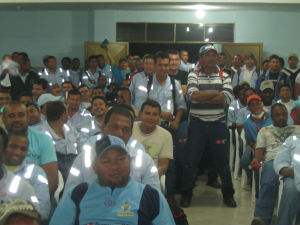
All progressive and revolutionary people should condemn the assassination of union leader Wílter de Jesús Quintero Tapasco in the mining town of Marmato in the northern province of Caldas, Colombia. At 2 a.m. on August 13, Tapasco was ambushed and shot at close range as he finished his shift at the Mineras Nacionales de Colombia gold mine. Tapasco was only 26 years old. He was a dedicated and fearless leader of one of the most marginalized segments of the Colombian population.
The murder of yet another labor leader follows a long pattern of state violence to intimidate the miners and other workers of Colombia and discourage them from organizing for their rights. In April, when the District Attorney of Marmoto travelled to the mines to investigate the unrelenting violence against the workers he was shot at and chased off. The government of Juan Manuel Santos portrays itself as a liberal option to the hardline Alvaro Uribe government (2002-2010) but the ongoing repression indicates otherwise.
The strategic value of the United States’ Colombian colony
Colombia has long functioned as imperialism’s “Israel” in Latin America, a gigantic battleship whose mission is to keep the region in check. With the leftward shifts that occurred in Ecuador & Venezuela—Colombia’s neighbors—and the continent as a whole, Columbia’s strategic importance for imperialism increased.
In 2009, Ecuador’s president Rafael Correa forced the U.S. to close their military base in Manta sarcastically calling out the U.S.’s imperial arrogance: “We can negotiate with the U.S. about a base in Manta, if they let us put a military base in Miami.”
True to its form, the U.S. responded by building nine new military bases across Colombia. A leaked U.S. Air Force cable confirmed as much, stating that the deal with former president Uribe offered “a unique opportunity for conducting full spectrum operations in the region against various threats, including “anti-U.S. governments” (The Progressive March 2010).
Colombia’s value to the U.S. is not just of geo-political importance. Colombia is Latin America’s fourth largest economy with a GDP of $683 billion dollars. Its vast natural resources—including gold, oil, emeralds, coffee, cut flowers- reap enormous profits for multinational corporations. Even the capitalists themselves recognize how untenable the system is and warn the headstrong Colombian elite to implement reforms. Lars Christian Moller, a Senior Country Economist at the World Bank, warns that Colombia’s stark inequality and regressive tax system are a recipe for future social disaster. In a report released yesterday, London’s Financial Times warned that Colombia’s system makes it among the five most fragile in the world.
Behind the attacks
This central contradiction—a super-rich country, with a poor, exploited populace—is what drives the naked class warfare in Marmato and across Colombia. The workers are standing up to demand a bit more of the very wealth they produce but their organizing efforts are met with sheer repression. This ensures that further radicalization of the producing classes and the continuation of the seven-decade long civil war.
The ongoing violence has to be seen in the context of a split in the Colombian ruling-class as to how to best rule the country and continue to siphon off Colombia’s enormous wealth. In December of last year, the armed revolutionary guerrilla army, the FARC and the government signed “a peace agreement.” This was heralded the world over as a step in the right direction for all parties in the Colombian conflict. But Santos was guilty of double-dealing, taking advantage of the cease fire to jail undesirable political activists and encroach further into FARC-controlled territory.
As the repression continued, Santos continued to cruelly tax the Colombian working class and peasantry and slash social benefits. Like his predecessors, he is ignoring the underlying social inequality that gave birth to the struggle in 1948 when small farmers picked up guns to defend themselves against the violence of the landowning class and their state backers. (For more information on the history of the FARC click here).
There were those in power who disagreed with any type of “negotiations” with the FARC. These fascist, paramilitary forces were personified by the hated former president Uribe. Some analysts argue that the latest round of persecution is an attempt to sabotage the “peace accord” and continue a war of extermination against the resistance. The political class’s U.S. handlers have given them the OK to employ a “good cop/bad cop” strategy as long as the deluge of profits from this oil and mineral-rich country continues to flow northward.
The struggle for a sovereign Colombia continues
As part of the so called “peace” agreement, the Colombian government was forced to provide for and guarantee the security of the union leadership. Betraying their word, the Santos government took away the security teams and assigned them to aspiring political candidates. This left the union leadership and rank-and-file exposed to the companies’ paramilitary death squads. The national leadership of SINTRAMIENERGETICA (National Union of Mine, Petrochemical, Agroricalutal and Energy Workers) has called for a demonstration in the capital Bogotá against the Santos government for Wednesday, a week after the assassination of their compañero.
Rest in Power Wílter de Jesús Quintero Tapasco and the thousands of valiant Colombians who have always stood up to imperialism and their Colombian underlings against the selling off of their patria!





